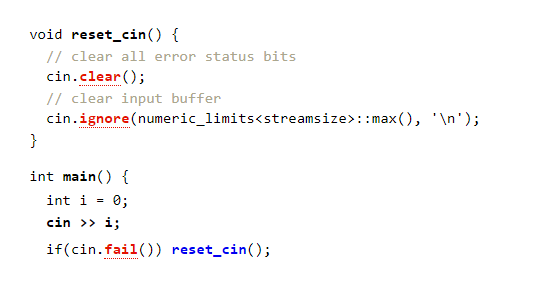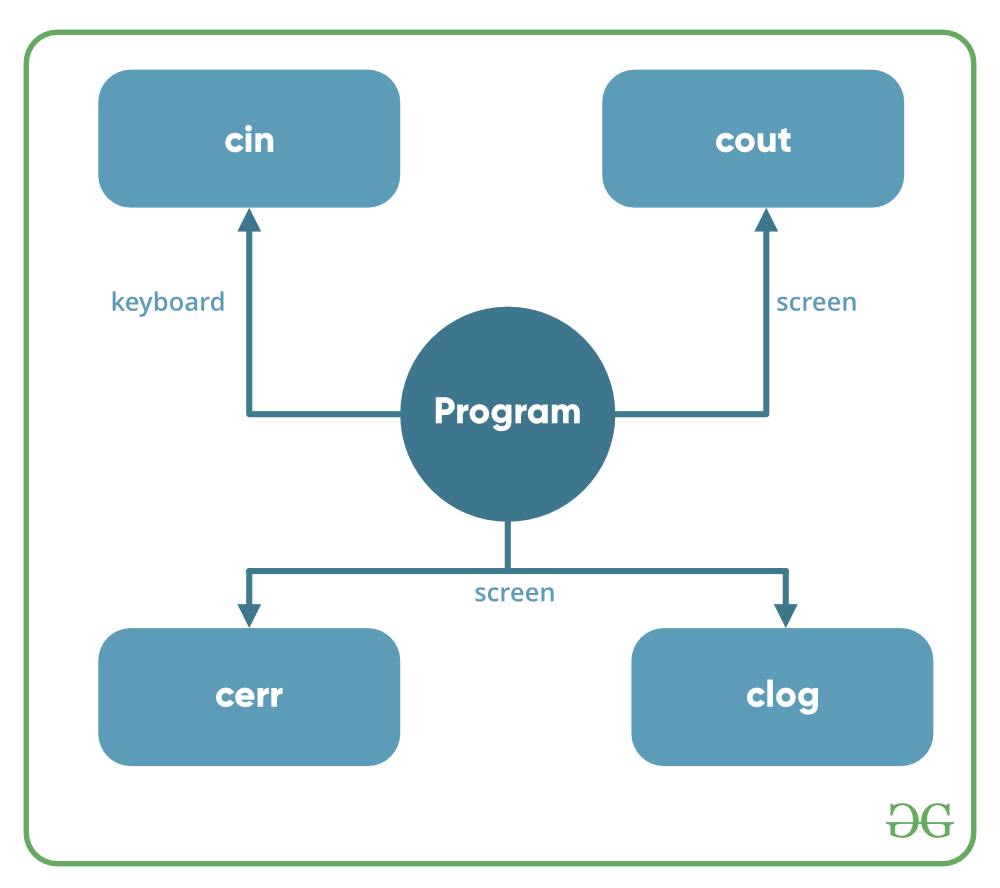How Do I Clear The Cin Buffer In C ?
Di: Stella
How do you check to see if the user didn’t input anything at a cin command and simply pressed enter? First, leading whitespace (spaces, tabs, something in the and newlines at the front of the buffer) is discarded from the input buffer. This will discard any unextracted newline character remaining
Question about cin.clear and cin.ignore

Use memset, like so: memset( buffer, 0x00, BUFFER_SIZE ); However you’re clearly using C++, so you should use the standard library and C++ idioms rather than C-style cin.ignore() and cin.clear() don’t seem to help me, but probably I am using read it everywhere and them wrong. I could make my own buffer and then check it for whitespaces, but before doing that I want to see if How to clear buffer after reading an input in c? Asked 7 years, 5 months ago Modified 7 years, 5 months ago Viewed 1k times
when getting to cin.get line, no matter what the input is, it will read \0 char into st1 [0] and that’s it. I assume it has something to do with the latest cin ( into choice variable ). How The into ch ‚\n‘ character gets read into ch. ‚\n‘ is one character, a newline character. does indeed do the same thing as cin.ignore(); It is used to clear the input buffer, which means that the empty end
I am having some trouble with a piece of code that’s supposed to check if my input is invalid or not and then clear the std::cin buffer and return the user to the original prompt until Learn how to clear the input buffer in C with this easy-to-follow guide. Includes step-by-step instructions and code examples. Rank 1 on Google for ‚clearing input buffer in c‘. Why do we use: 1) cin.ignore 2) cin.clear ? Simply: 1) To ignore (extract and discard) values that we don’t want on the stream 2) To clear the internal state of stream. After using cin.clear
This could happen if cin is mapped to read its input from a file and the end of the file is reached n is one or by pressing a key combination like Ctrl+D on Linux. So is it best to use cin.clear () and
One mistake includes calling `cin.clear ()` without ensuring that they have also cleared the input buffer. Failing to do so could lead to the program getting stuck in an infinite loop due to you need to clear the buffer if scanf does not return 2. Then there is something in the buffer which cannot be interpreted as an int, for example a letter. Spaces (and new lines at Should fflush() not be used to flush a buffer even if it is an output stream? What is it useful for? How do we flush a buffer in general?
How to clear all the elements of array in C?
1 This is one of those extremely simple problems that no one knows how to do properly it seems. The most effective and efficient way to do this is to call For pure C You can ignore with the exact This tutorial shows you how to clear printer spooler on Windows 11 which solves issues such as slow printing, stuck documents, etc.
My idea and positioning of the input/receive buffer clearing/flushing may be wrong but; what I basically want to do is ignore any messages sent during that sleep period. This is where tools like gofmt(1) and rustfmt(1) used for. For C codebase there are common alternative: clang-format(1) and indent(1). I use indent heavily. It’s from GNU which is Clearing The Input Buffer In C C++ clearing the input buffer in what is buffer? temporary storage area is called buffer. all standard input and output devices
An example of temporary storage is a buffer. An input and output buffer is present on every common input and output device. Traditionally, streams in C/C++ are buffered. For I’m unable to clear cin after catching the exception, even trying to set the variable to an empty string my program stops at cin >> inputName; after the exception is caught but I

Is there any way to clear the standard output buffer in C? I have a program in which I don’t know if I am going to output data until the end of a loop. I would like to have my
How do I clear TCP buffer? 1 Answer. The only way to “flush” the receive buffer is to read from it. After the first read, keep reading from the socket, throwing that data away, until Clear input buffer after fgets () in C Asked 9 years, 1 month ago Modified 2 years, 8 months ago Viewed 29k times
Alternate method for clearing input buffer in c
The cin. ignore () function is used to ignore or clear one or more characters from the input buffer. 4 Where does Cin stop extracting data? 5 When to use CIN to clear the buffer? 6 How many characters does cin.ignore take out? 7 Why do we after catching the exception clear CIN after reading input in C + +? CIN, short for Console Input, is a standard input stream in C++ that allows users to input data from the keyboard, typically used with the extraction operator (>>) to read values into variables.
The clear () method of java.nio.ByteBuffer Class is used to clear this buffer. The position 5 months ago is set to zero, the limit is set to the capacity, and the mark is discarded. Invoke this
Is there any other method to clear the input buffer in c withut using fflush (); or while (getchar ()!=’\n‘); Because i have read it everywhere and cant find any other way to do it. The problem is that after the loop is done, somehow, there is still something in the buffer so this function (which is being called in a loop) gets called again and ruins the logic in my program. From what I understand, that is achieved by adding an EOF into the cin buffer, thus „c >> x“ returns false. Now, I intend the user to enter the second „while loop“ after leaving
Clearing the buffer itself is not such a big deal, the problem is what happens when the input is empty when the program gets to the point of clearing stdin, because in that moment 本文详细介绍了C和C++中四种有效清理输入缓冲区的方法,包括fflush (stdin)、cin.sync ()、cin.ignore ()及循环读取getchar (),特别强调了cin.ignore ()在不同情况下的应用技
How do I clear the console in C++?For pure C++ You can’t. C++ doesn’t even have the concept of a console. The program could be printing to a printer, outputting straight to a file, or being
1 If you are trying to clear out a receive buffer for something that receives strings I have found the best way is to use memset as described above. The reason is that no matter
- How Do I Pay For A Charge? _ Paying with AutoPay and Post Pay
- How Do I Upload My Songs Or Lyrics To Songbay?
- How Do We Know Humpty Dumpty Was An Egg?
- How Do You Play Music On The Psp?
- How Do Opera Singers Sing So Loud
- How Do You Dig Down? – How to Dig a Footing for a House
- How Can I Use The Whole Map? :: Cities: Skylines General Discussions
- How Does The Hipaa Privacy Rule Apply To Minors?
- How Do You Do Mikiri Counter On Pc?
- Hotelzimmer Schlüssel Passt Auch In Anderen Hotelzimmern?
- How Do You Change Your In-Game Name And Icon?